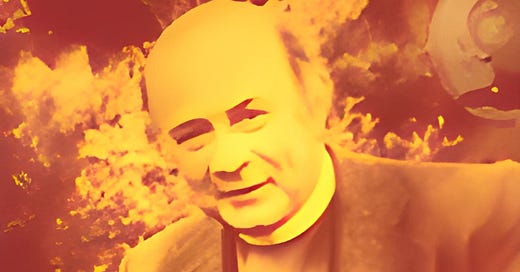O Root of Jesse, Who standest for an ensign of the people, at Whom kings shall shut their mouths, unto Whom the Gentiles shall pray: Come and deliver us, and tarry not.
Fr Vanstone (1923-1999) served as a pilot in the Royal Air Force in the Second World War, then took a double first at Oxford before training for the priesthood and reading theology at Cambridge. A celibate priest, he devoted his ministry to service in poor parishes until a heart attack persuaded him to take up residence as a Canon of Chester Cathedral. His already substantial corpus of spiritual writing was grounded in a sense of the stability of the Church, which the poor he served sought in it particularly. He was therefore impatient of innovations in liturgy and of pretences to “social action” conducted by pen from within the walled safety of the cathedral close, well behind the front lines. The following excerpt of one of his best-loved works makes the connection between real love, which must be costly, and the discipline of the Christian life: not giving a free reign to modernity, as though the new were necessarily better than the old, but reigning the new in with the unchanging wisdom of ages. —T.P.
From W. H. Vanstone, Love’s Endeavour, Love’s Expense
The Church presents itself to man as an institution with a history. It is something which the present inherits from the past, already given. To repudiate form simply because it is no longer ‘natural’ would be to refuse that surrender of one’s freedom and spontaneity which is involved authentic love. But, on the other hand, the form of the church is itself the product of history, and determined at least in part by the attitudes and presuppositions of other ages. It may be that a form which disciplines the response of one age distorts or destroys the response of another: the form has come to have such associations that it cannot longer express what a man would say, but only distort or destroy it. The need then arises for reform. But the reform of the church is a matter of extreme delicacy and difficulty. For the search is not for the form which will most easily contain the spontaneity of the present age, but for a form which will impose upon it the degree of discipline. The task is not simply to bring the spontaneity of the present age within the church: it is to form that spontaneity into the costly offering of love. Reform of the church requires more than sociological insight into contemporary trends and attitudes: it requires also the artist’s understanding and the lover’s experience of a costly discipline of love.
O Lord Jesu Christ, the new shoot from the hewn down stump of Jesse's line,
in whom all the promises should be fulfilled;
the champion of Thy people,
to whom the Gentile nations should turn in submission and obedience:
Thou hast come of the seed of David according to the flesh,
being born in obscurity of a maiden of the royal line;
Thou hast set up Thy holy catholic Church,
commanding Thine apostles to make disciples of all nations
and to train all peoples in obedience to Thy holy commandments:
Come now, we pray Thee, by Thy grace, and tarry not,
hasten the manifestation of Thy kingdom;
grant that Thy Church may continually be increased
by the gathering in of new children to Thee,
and perfected by the increasing devotion of those who have been regenerated.
(The Advent Antiphons With Scripture references and paraphrases. By A.C.A. Hall, Bishop of Vermont.)





